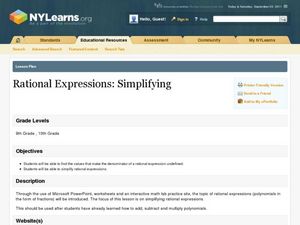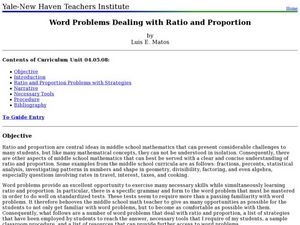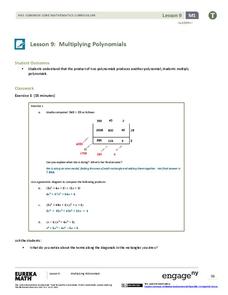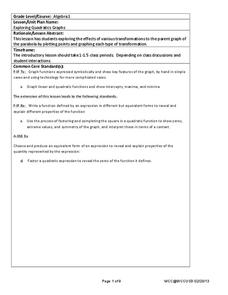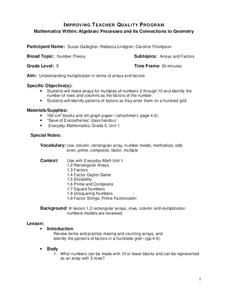EngageNY
Structure in Graphs of Polynomial Functions
Don't allow those polynomial functions to misbehave! Understand the end behavior of a polynomial function based on the degree and leading coefficient. Learners examine the patterns of even and odd degree polynomials and apply them to...
EngageNY
Using Matrix Operations for Encryption
Data encryption is an important security measure for sensitive data stored on computers. Pupils learn how to utilize matrices for creating code. They also get a great review of matrix multiplication, inverse matrices, and the identity...
EngageNY
Completing the Square (part 1)
Avoid the trap of memorizing steps when completing the square with a resources that provides a conceptual approach to completing the square. Learners that are able to recognize a perfect square trinomial are ready to complete the...
EngageNY
Deriving the Quadratic Formula
Where did that formula come from? Lead pupils on a journey through completing the square to discover the creation of the quadratic formula. Individuals use the quadratic formula to solve quadratic equations and compare the method to...
Curated OER
Rational Expressions: Simplifying
This two-day activity will help the class simplifying rational expressions. It also has an emphasis on understanding when a rational expression is undefined. The activity contains powerpoint presentations, worksheets, and answer key.
Curated OER
Word Problems Dealing with Ratio and Proportion
Mindful middle-schoolers read and solve a number of word problems. Learners copy and discuss what they believe their strategies are in solving each problem. They also write their findings and share with the rest of the class.
Mathematics Assessment Project
Solving Quadratic Equations
Scholars first complete an individual assignment using a quadratic equation to model the movement of a bus around a corner. Learners then discuss their solutions with classmates and analyze the provided sample responses.
Curated OER
Beans, Beaks and Bears
Students explore evolution. After watching a video on evolution, students perform a variety of experiments using beans which illustrate the concept of evolution.
Alabama Learning Exchange
Classifying Complex Numbers
Imaginary numbers are a real thing. Scholars learn about complex numbers, real numbers, and imaginary numbers. They classify given numbers as strictly complex, strictly real, or strictly imaginary in an individual or group activity.
Curated OER
Exponential Expressions - Perfect Squares, Square Roots
Color tiles are used to model perfect squares. Alone or in pairs, middle schoolers will find patterns. Afterward, the relationship between perfect squares and roots will be discussed as a whole class.
Curated OER
Matrix Analysis of Networks
Explore the connection between a finite graph, a directed graph, and a matrix. Graph lines and identify the relationship of matrices in real-world scenarios. Then use this information to work with a partner to plan and design a...
Willow Tree
Multiplying Polynomials
Make two parts into a whole. Scholars learn to multiply polynomials to create a simplified polynomial expression. Polynomials include monomial, binomials, and trinomials.
Curated OER
Seeing Dots
Your algebra learners interpret algebraic expressions, in order to compare their structures, using a geometric context. They also discern how the two expressions are equivalent and represent a pattern geometrically and algebraically.
West Contra Costa Unified School District
Investigating the Discriminant
When is finding the discriminant enough? Using the quadratic formula helps find solutions to quadratic equations, but there are times when just using the discriminant is appropriate. Use this algebra II lesson to help classes see...
West Contra Costa Unified School District
Simplifying Radicals – Day 1
It doesn't get simpler than this. Scholars first learn to simplify radicals by determining the prime factors of the radicand. The lesson progresses to simplifying radicals involving algebraic expressions in the radicand.
West Contra Costa Unified School District
Exploring Quadratics and Graphs
Young mathematicians first graph a series of quadratic equations, and then investigate how various parts of the equation change the graph of the function in a predictable way.
West Contra Costa Unified School District
Divisibility Rules Justified
How do you know if a number is divisible? Instructors first prove the divisibility rules for three and four and then class members use this modeling to prove given divisibility rules for eight and nine either individually or in...
Curated OER
Playing the LCM Game
Students practice finding the least common multiple of two numbers. In this practice finding the least common multiple of two numbers lesson, students play head-to-head against their classmates. Students play a version of...
Curated OER
Mathematics Within: Algebraic Processes and Its Connections to Geometry
Fifth graders discover the connections between algebra and geometry. With a focus on arrays and factors, they are introduced to multiplication. They develop an array for multiples of 2 through 10 and identify the factors of each row....
Curated OER
Prime Numbers and Factors
Students determine factors of numbers to 100 and identify prime factors; students differentiate prime and composite numbers by the factors of the numbers.
Curated OER
Exploring Multiplication Functions
Fourth graders investigate the terms "factor" and "product." In this mathematics lesson, 4th graders practice solving problems to find the products and factors present in different algebraic expressions.
Curated OER
Guzzinta
Young scholars explore strategies to solve number problems. They study divisibility rules. Students examine and practice multiples, factors, and palindromes. In groups, young scholars play a "number property" game.
Curated OER
Quadratic Equations
Tenth graders review algebraic methods of solving quadratic equations. Students discuss several methods of solving quadratic equations. They practice factoring and finding the roots of an equation for solving. A calculator is used to...
Curated OER
Prime & Composite Numbers: Algebra/Geometry Institute 2009
Learners create factor trees. In this prime and composite lesson, students model fractions using tiles. They create factor trees and identify prime and composite numbers. Learners use grid paper and tiles to model...




